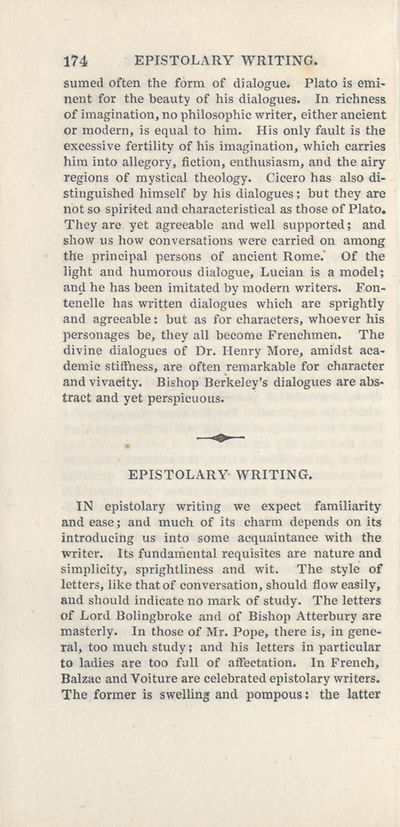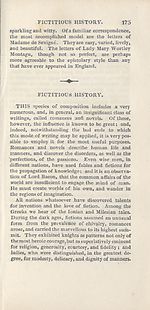Education > Essays on rhetoric
(202)
Download files
Complete book:
Individual page:
Thumbnail gallery: Grid view | List view

174 EPISTOLARY WRITING.
sumed often the form of dialogue. Plato is emi¬
nent for the beauty of his dialogues. In richness
of imagination, no philosophic writer, either ancient
or modern, is equal to him. His only fault is the
excessive fertility of his imagination, which carries
him into allegory, fiction, enthusiasm, and the airy
regions of mystical theology. Cicero has also di¬
stinguished himself by his dialogues; but they are
not so spirited and characteristical as those of Plato.
They are yet agreeable and well supported; and
show us how conversations were carried on among
the principal persons of ancient Rome. Of the
light and humorous dialogue, Lucian is a model;
and he has been imitated by modern writers. Fon-
tenelle has written dialogues which are sprightly
and agreeable: but as for characters, whoever his
personages be, they all become Frenchmen. The
divine dialogues of Dr. Henry More, amidst aca¬
demic stiffness, are often remarkable for character
and vivacity. Bishop Berkeley’s dialogues are abs¬
tract and yet perspicuous.
EPISTOLARY WRITING.
IN epistolary writing we expect familiarity
and ease; and much of its charm depends on its
introducing us into some acquaintance with the
writer. Its fundamental requisites are nature and
simplicity, sprightliness and wit. The style of
letters, like that of conversation, should flow easily,
and should indicate no mark of study. The letters
of Lord Bolingbroke and of Bishop Atterbury are
masterly. In those of Mr. Pope, there is, in gene¬
ral, too much study; and his letters in particular
to ladies are too full of affectation. In French,
Balzac and Voiture are celebrated epistolary writers.
The former is swelling and pompous; the latter
sumed often the form of dialogue. Plato is emi¬
nent for the beauty of his dialogues. In richness
of imagination, no philosophic writer, either ancient
or modern, is equal to him. His only fault is the
excessive fertility of his imagination, which carries
him into allegory, fiction, enthusiasm, and the airy
regions of mystical theology. Cicero has also di¬
stinguished himself by his dialogues; but they are
not so spirited and characteristical as those of Plato.
They are yet agreeable and well supported; and
show us how conversations were carried on among
the principal persons of ancient Rome. Of the
light and humorous dialogue, Lucian is a model;
and he has been imitated by modern writers. Fon-
tenelle has written dialogues which are sprightly
and agreeable: but as for characters, whoever his
personages be, they all become Frenchmen. The
divine dialogues of Dr. Henry More, amidst aca¬
demic stiffness, are often remarkable for character
and vivacity. Bishop Berkeley’s dialogues are abs¬
tract and yet perspicuous.
EPISTOLARY WRITING.
IN epistolary writing we expect familiarity
and ease; and much of its charm depends on its
introducing us into some acquaintance with the
writer. Its fundamental requisites are nature and
simplicity, sprightliness and wit. The style of
letters, like that of conversation, should flow easily,
and should indicate no mark of study. The letters
of Lord Bolingbroke and of Bishop Atterbury are
masterly. In those of Mr. Pope, there is, in gene¬
ral, too much study; and his letters in particular
to ladies are too full of affectation. In French,
Balzac and Voiture are celebrated epistolary writers.
The former is swelling and pompous; the latter
Set display mode to:
![]() Universal Viewer |
Universal Viewer | ![]() Mirador |
Large image | Transcription
Mirador |
Large image | Transcription
| Antiquarian books of Scotland > Education > Essays on rhetoric > (202) |
|---|
| Permanent URL | https://digital.nls.uk/113761916 |
|---|
| Description | Thousands of printed books from the Antiquarian Books of Scotland collection which dates from 1641 to the 1980s. The collection consists of 14,800 books which were published in Scotland or have a Scottish connection, e.g. through the author, printer or owner. Subjects covered include sport, education, diseases, adventure, occupations, Jacobites, politics and religion. Among the 29 languages represented are English, Gaelic, Italian, French, Russian and Swedish. |
|---|

